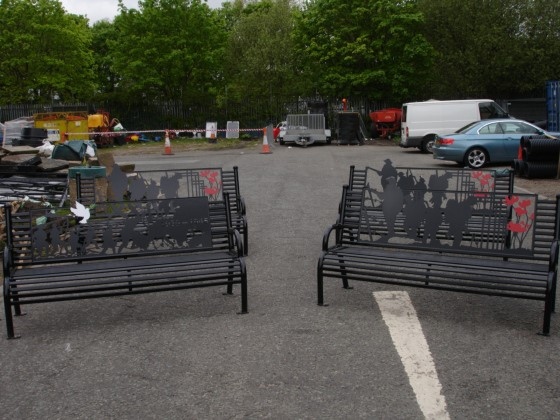The Battle of the Somme, 1916 – Heywood remembers
Date published: 20 May 2016

The four specially made memorial benches for Heywood War Memorial Gardens
The 100 Year anniversary of the Battle of the Somme will be commemorated with a service in remembrance and the unveiling four specially made memorial benches in the Heywood war memorial gardens to complement the centenary work undertaken thus far.
Heywood Rotary Club working with the Lancashire Veterans Association have funded two of the four benches which will replace the four benches presently facing the memorial.
Due to the major Battle of the Somme event being held in Manchester it has been decided to dedicate the benches two weeks earlier at the annual Heywood 1940s Day event and incorporate the start of Armed Forces week by raising the Armed Forces flag.
Fought between July and November 1916, the Battle of the Somme was one of the defining events of the First World War.
The Somme offensive was planned as the major Allied effort on the Western Front for 1916, but the start of a desperate battle between French and German forces at Verdun meant that the British Army assumed the main role.
After an intense, week-long artillery bombardment of German positions, the infantry began their advance at 7.30am on the clear midsummer’s morning of 1 July 1916.
Twenty four hours later and the British casualty rate reached 58,000 including 19,240 British soldiers who lost their lives on the first day of the battle. The battle raged until 18th November 2016 and the British sacrifice was high, 420,000 men paid the ultimate sacrifice.
The offensive continued over the following months, and men from every part of Britain and across the Empire took part. Both sides committed huge quantities of manpower and munitions to the struggle.
When the offensive was halted in November, more than 1,000,000 Commonwealth, French and German soldiers had been wounded, captured, or killed.
Many young men volunteered for Kitchens new army. The introduction of the Pals battalions meant that friends, workmates and streets would volunteer on mass knowing they would fight alongside their brothers and friends, they would face the enemy together. The harsh reality of this was that entire families would be killed together. An entire generation from a village or town would be wiped out.
Every family across Britain was affected by the Great War, the 1 July is known as the bloodiest day in British Military history.
The Battle of the Somme was the bloodiest battle of the Great War.
Do you have a story for us?
Let us know by emailing news@rochdaleonline.co.uk
All contact will be treated in confidence.
Most Viewed News Stories
- 1Newhey's Char Steakhouse and Bank Chamber close with immediate effect
- 2Six men arrested in Rochdale child exploitation investigation
- 3Royton haulage firm fined after Rochdale dad went to work and didn’t come home
- 4Two men arrested after police chase ends up in Middleton river
- 5Obituary: Jean Ashworth
To contact the Rochdale Online news desk, email news@rochdaleonline.co.uk or visit our news submission page.
To get the latest news on your desktop or mobile, follow Rochdale Online on Twitter and Facebook.


